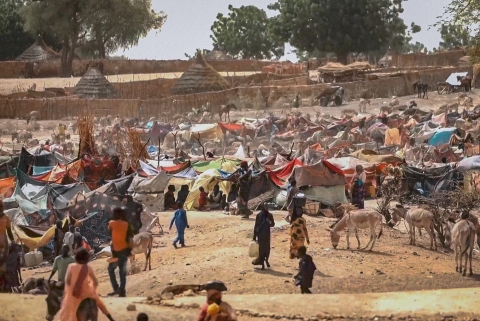
The civil war nears a year old and remains largely ignored despite urgent reports of ethnic killings, dire circumstances.
The following article was published in the March-April 2024 issue of NewsNotes.
Since last April, war has ravaged Sudan. As the death toll rises, unparalleled numbers of internally and, increasingly, externally displaced people crowd camps, facing unceasing threats of violence. But with the world’s attention on armed conflicts in Ukraine and the Middle East, the crisis in Sudan has been largely ignored.
In February, with the pending release of a devastating U.N. Security Council Panel of Experts on Sudan Report on Darfur, outlining killings on a higher scale than previously recognized and naming perpetrators; and the release of a UN Human Rights Office report documenting war crimes and atrocities, the Biden Administration signaled a renewed interest in working for an end to the fighting.
On February 26, Secretary of State Antony Blinken announced the appointment of Tom Periello as U.S. Special Envoy for Sudan, “to empower Sudanese civilian leaders and drive (U.S.) engagement with partners in Africa, the Middle East, and the international community to forge a united approach to stop this senseless conflict, prevent further atrocities, and promote accountability for crimes already committed.”
Two days later, U.S. Ambassador to the U.N. Linda Thomas-Greenfield released a statement on the Panel of Experts report. “I am deeply disappointed,” she wrote, “that the allegations detailed in this report have received such little attention, both inside the UN Security Council and outside the United Nations…To date, the war in Sudan has displaced eight million people. Communities are barreling towards famine. Disease is rampant. The people of Sudan feel that they have been forgotten. We cannot allow that feeling to become a reality… It is clear that this is an urgent matter of peace and security that demands greater attention from the Security Council. The Council must act urgently to alleviate human suffering, hold perpetrators to account, and bring the conflict in Sudan to an end. Time is running out.”
It is not yet clear what actions the United States may propose within the Security Council. Human Rights Watch has suggested that the council “should finally fulfil its mandate to prevent further atrocities in Darfur and act on threats to international and regional security. It can start by adding the names of those responsible for these heinous crimes to the council’s sanctions list as part of a broader strategy to end widespread abuses,” noting that the Panel of Experts report clearly identifies such actors. These include warlords inside Sudan, and foreign powers such as the United Arab Emirates, which has violated an arms embargo by shipping arms to the Rapid Support Forces (RSF), one of two main warring factions in Sudan.
Since the conflict began in April between the RSF, led by then-Vice President Mohamed “Hemedti” Hamdan Dagalo, and de-facto President Abdel Fattah al-Burhan’s Sudanese Armed Forces (SAF), pro-democracy groups in Sudan have urged the international community not to take sides, but to apply sanctions against the warring factions and demand a return to civilian rule. But the armed conflict in Sudan quickly became a proxy war for other regional and global actors.
The United Arab Emirates actively support the RSF. Iran supports and arms the SAF. Russia supports the RAF, with Wagner Group mercenaries joining Sudanese RSF troops on the ground. Multiple reports have also indicated that Ukrainian special forces are in Sudan working alongside the SAF against the RSF and Wagner forces. While Saudi Arabia is generally seen as supporting the SAF in the interest of countering the United Arab Emirates’ influence in the region, the Saudis have also worked closely with the United States in trying to mediate peace between the two sides.
In December, the resumption of peace talks was announced for January, but talks have failed to materialize. Dagalo has announced a desire for a ceasefire during recent diplomatic visits to other African countries, but critics question his motives and credibility, and see such visits as an effort to court international support and be seen as a legitimate Sudanese leader for the future, after toppling a democratic, civilian-led transition government together with Burhan in 2021.
The UN Human Rights Office reports that more than 8 million Sudanese people have been displaced in the conflict. Most are internally displaced people (IDPs), but over half a million have fled into neighboring Chad, and hundreds of thousands more have fled to South Sudan, overrunning UN camps already crowded with South Sudanese IDPs, especially in Malakal, where Maryknoll Fr. Mike Bassano served as a chaplain for 10 years before leaving in June 2023.
The United Nations had previously reported a total of approximately 12,000 deaths in the conflict since April, but the Panel of Experts report documents as many as 15,000 deaths in one city alone, El Geneina in West Darfur. The total killed in the conflict is unknown. War crimes and grievous human rights abuses are documented in the report. Read the report at https://mogc.info/Darfur
Photo of refugee camp in Chad by Henry Wilkins, Voice of America, via WikiMedia.
